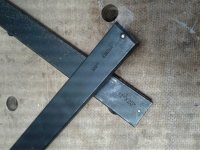mino
Member
Made in China. Made in Germany. Made in XYZ does not tell you anything of the quality of the product.
Only, "made by company ABC at a plant CDE using a technique of FGH" can. Within means.
That said, moving production to a cheaper location AND keeping prices the same is not all that OK with me. But we will have to take this one with Bessey I am afraid.
Festool sells them around the Bessey price. Sometimes a bit more, sometimes a bit less. So fine there with me. But even if they were a lot more expensive, that would be fine - as Bessey is the maker here, not Festool.
About a year ago, in Europe Bessey tried to sell these cheaper at about €15/$20+VAT or so. Unfortunately I bought mine just before I became aware these are Bessey clamps ... so not savings for me.
Then they increased prices to €25+VAT again. I guess Bessey was "testing waters" if reduced prices can increase their volume. It probably did not, so they just went back to their original value-based pricing. Not happy about that one iota.
Besides that, today Made in China (Taiwan) or Made in P.R.C or made in R.O.C (Taiwan) or made in China (mainland) does not mean anything. There are companies in both places which make cutting edge stuff as well as those which make crap. Usually, if you do not have a crappy rep, you get what you pay for. Same as everywhere.
Only, "made by company ABC at a plant CDE using a technique of FGH" can. Within means.
That said, moving production to a cheaper location AND keeping prices the same is not all that OK with me. But we will have to take this one with Bessey I am afraid.
Festool sells them around the Bessey price. Sometimes a bit more, sometimes a bit less. So fine there with me. But even if they were a lot more expensive, that would be fine - as Bessey is the maker here, not Festool.
About a year ago, in Europe Bessey tried to sell these cheaper at about €15/$20+VAT or so. Unfortunately I bought mine just before I became aware these are Bessey clamps ... so not savings for me.
Then they increased prices to €25+VAT again. I guess Bessey was "testing waters" if reduced prices can increase their volume. It probably did not, so they just went back to their original value-based pricing. Not happy about that one iota.
Besides that, today Made in China (Taiwan) or Made in P.R.C or made in R.O.C (Taiwan) or made in China (mainland) does not mean anything. There are companies in both places which make cutting edge stuff as well as those which make crap. Usually, if you do not have a crappy rep, you get what you pay for. Same as everywhere.


